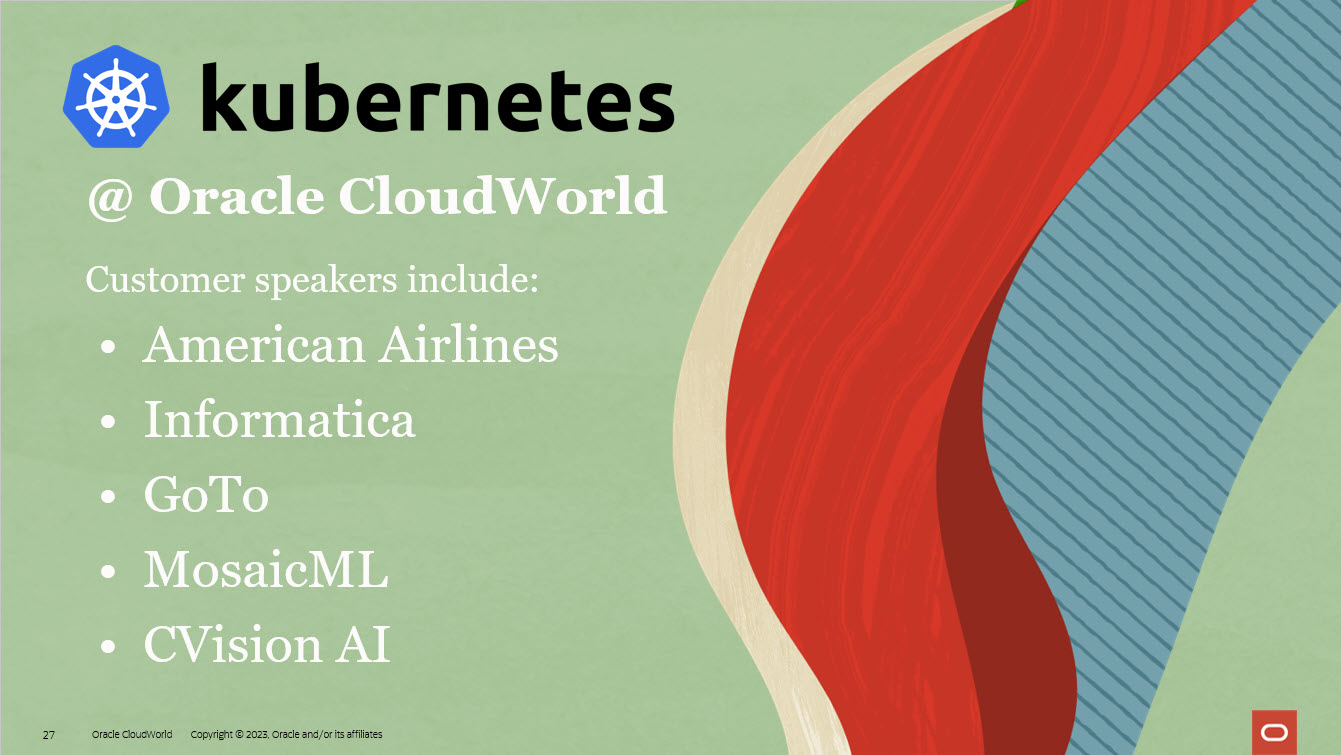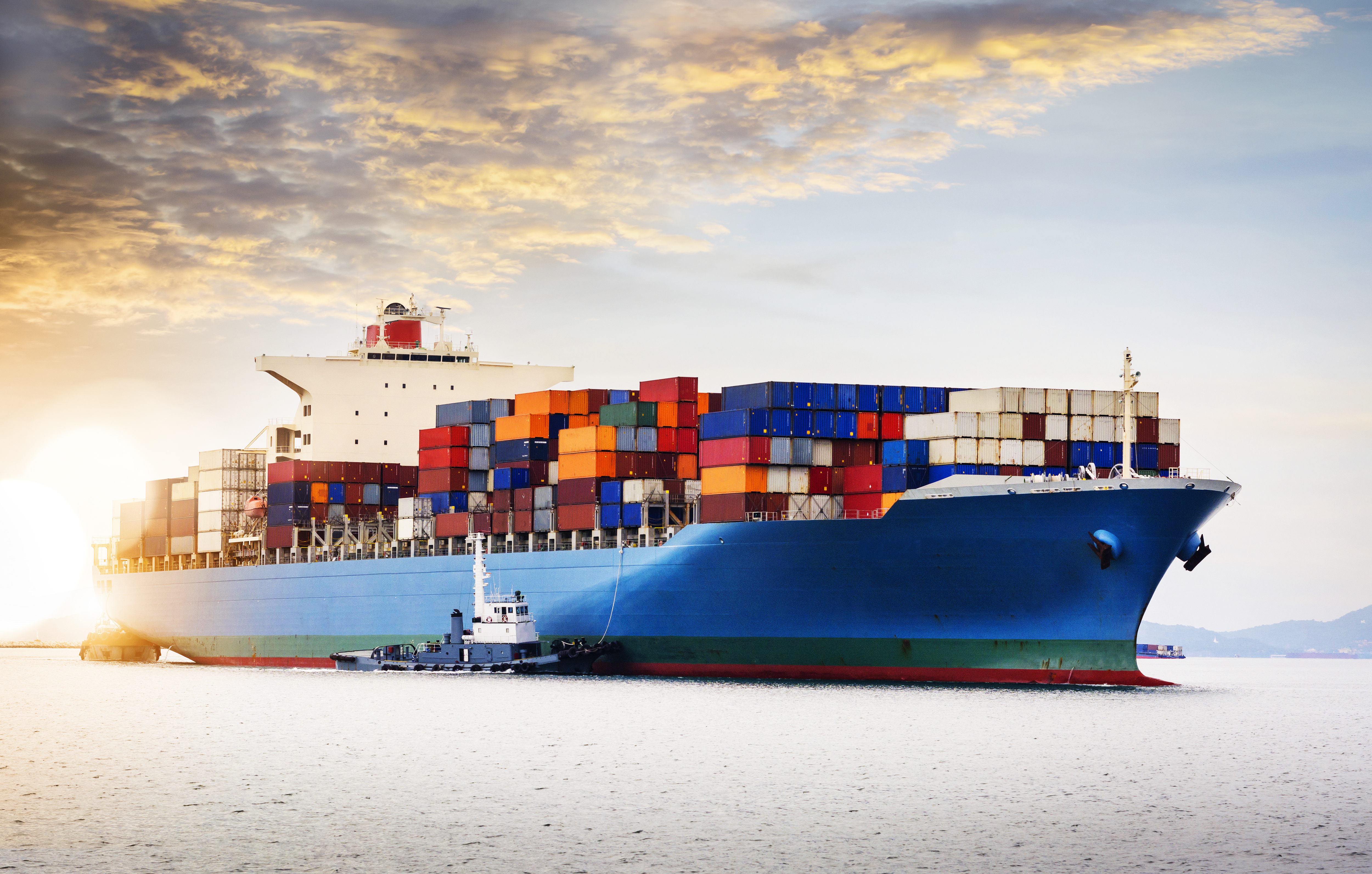
With Kubernetes now mainstream in the enterprise, including among Oracle Cloud Infrastructure (OCI) customers, it’s going to be a hot topic at the upcoming Oracle CloudWorld occurring September 18–21 in Las Vegas, NV. The Oracle annual conference will be buzzing with technology experts and IT leaders seeking the latest knowledge and sharing their experience and best practices for leveraging Kubernetes in the enterprise.
There will be more than 25 Kubernetes-related sessions from OCI customers and technical experts that target development practitioners, senior leaders, and executives. With topics ranging from initial modernization efforts through advanced use cases, the conference is the perfect opportunity for you to up your Kubernetes game, connect with peers, and learn from other large enterprises going through a similar journey as your own.
This blog post highlights a few Kubernetes sessions that you won’t want to miss. Secure your conference pass today and add these to your schedule!

Customer panels
Kubernetes for ISV, SaaS: American Airlines, Informatica, GoTo share their story
Tech providers increasingly standardize on Kubernetes across their digital portfolio, bringing more services into the Kubernetes fold and unified API. This spans applications as well as other workloads, such as databases, streaming, batch and extract, transform, load (ETL) jobs, IT automation, and more.
This panel gives an insider look at the Kubernetes journey of independent software vendors (ISVs). Discover the drivers, return on investment (ROI) of Kubernetes standardization, and tips for modernizing complex enterprise apps. Check out the blueprint for modernization rollout with consistent operations across environments, plus the integration patterns for common use cases: “Split” architectures, data operations, multitenancy, compliance, and more.
The following speakers are appearing at the panel on Tuesday, Sep 19 from 5:00 to 5:45 pm PDT:
-
Jason MacZura, senior technical delivery manager at American Airlines [see “Five questions with Jason MacZura“]
-
Toby Foss, director of cloud network operations at Informatica
-
Sebastian Daehne, director DevOps engineering at GoTo [see “Five questions with Sebastian Daehne“]
MosaicML and CVision AI: Enabling the AI revolution with GPUs and Kubernetes
Artificial intelligence (AI) and generative pretraining transformer (GPT) have quickly become top priorities for unlocking application innovation and new monetization opportunities. GPUs are essential to accelerate model training for generative AI apps. Increasingly, developers standardize consuming GPUs and other technologies in their AI and machine learning (ML) stack by using Kubernetes.
Join this customer panel to hear AI innovators across computer vision and large language model (LLM) apps discuss key technologies powering their AI use cases: Compute, AI and ML tooling, data, and more. Learn the benefits of using Kubernetes for AI and ML workloads, design considerations for low latency, data sovereignty, scaling in a cost-effective way, and other critical requirements.
The following speakers are appearing at the panel on Thursday, Sep 21 from 9:00 to 9:45 am PDT:
-
Ajay Saini, platform engineering manager at MosaicML (now Databricks)
-
Benjamin Woodward, CEO and cofounder of CVision AI

Customer sessions
Reaching cruising altitude: American Airlines’ Kubernetes modernization journey
Eighteen months after migrating the world’s largest and oldest airline loyalty program from its data center into Oracle Container Engine for Kubernetes (OKE), American Airlines (AA) has been operating AAdvantage entirely on OCI. Learn how AA modernized its legacy, mission-critical app with Kubernetes, applying Oracle and open source technologies to transform how it’s deployed, managed, and monitored.
We deep-dive into implementing disaster recovery testing in production to accelerate incident response, how OCI and OKE have enabled AA to maintain the highest levels of security compliance, and discuss their exploration into other services, including AI and ML, Oracle GoldenGate, and OCI Integration.
The following speakers are leading the session on Wednesday, Sep 20 from 9:45 to 10:30 am PDT:
-
Jason MacZura, senior technical delivery manager at American Airlines [see “Five questions with Jason MacZura“]
-
Venkata Dinesh Pabolu, technical lead at American Airlines
-
Kamesh Challa, head of cloud engineering in manufacturing at Oracle
Informatica: 10 lessons on data and compliance in multitenant Kubernetes
Deploying global, highly available multitenant Kubernetes is challenging, especially when strict data and compliance requirements are involved. Learn how Informatica manages multiple Kubernetes apps across clouds, addressing diverse data sovereignty, compliance, security, performance, and geopolitics. Find tips to accelerate your success, including a blueprint for modernizing with Kubernetes.
Learn about multitenant architecture considerations and best practices for governance, security, data operations, and observability. Discuss a toolset for continuous integration and continuous delivery (CI/CD) deployment of complex services including databases, security, networks, audit gates, and performance benchmarking.
The following speakers are leading the session on Thursday, Sep 21 from 12:30 to 1:15 pm PDT:
-
Toby Foss, director of cloud network operations at Informatica
-
Narendran Bakthavatsalam, DevOps and Kubernetes manager at Informatica
-
Chandra Sripada, master principal cloud architect at Oracle
How GoTo runs a 24/7 cloud native platform across multiple clouds
GoTo’s cloud native real-time communications software-as-a-service (SaaS) suite operates in a hybrid fashion across both Oracle Cloud Infrastructure (OCI) and Amazon Web Services (AWS). Their engineering leaders tell how they structured and implemented cross-cloud domain name system (DNS), identity integration, service-to-service communication, CI/CD, and failover between clouds in this environment.
Learn how they run their Kubernetes clusters in a consistent fashion across both OKE and Amazon Elastic Kubernetes Service (EKS) with common orchestration, configuration, toolchains, and scaling approaches. Get a blueprint for implementing multicloud and pointers on services to use from any cloud platform.
The following speakers are leading the session on Wednesday, Sep 20 from 2:15 to 3:00 pm PDT:
-
Sebastian Daehne, director of DevOps engineering at GoTo [see “Five questions with Sebastian Daehne“]
-
Robert Heinzmann, manager of DevOps at GoTo
Monitor multicluster Kubernetes across regions and multicloud
Customers often deploy multiple Kubernetes clusters across OCI regions for development, production, disaster recovery, other environments, and across clouds. How can we monitor these multiple clusters while securely transmitting and storing metrics for long-term storage and analysis, all in a cost-effective, low-maintenance way?
Thanos, an open source Cloud Native Computing Foundation (CNCF) project, enables long-term storage for Prometheus metrics. Discover different deployment architectures of Thanos on OCI for key multiregion and multicloud use cases.
We demo the integration with OCI Networking, the S3-interoperable OCI Object Storage, and more. We conclude with a real-world use case of one of our customers sharing their experience and benefits.
The following speakers are leading the session on Thursday, Sep 21 from 12:30 to 1:15 pm PDT:
-
Oz Kologlu, head of engineering at Container Exchange Services
-
Ali Mukadam, cloud solutions architect at Oracle

OCI cloud native expert sessions
Pre-event training: A deep dive into Kubernetes using OKE – from Day 0 to Day 2 operations
In this hands-on training, Kubernetes experts from Oracle teach you everything you need to know about deploying secure, scalable apps on OKE. You gain comprehensive knowledge that enables you to develop and operate distributed applications successfully, from creating a cluster to implementing the best practices for managing and deploying microservices and containerized applications.
No previous Kubernetes experience is required, but an understanding of containers and the cloud is helpful. The training course covers:
-
Securing Kubernetes clusters and deployed applications
-
Monitoring and observing your Kubernetes cluster
-
Integrating applications with your networking pattern
-
DevOps and automation for your cluster
The following cloud native experts are leading the training on Monday, Sep 18 from 9:00 am to 1:00 pm PDT and again from 2:00 to 6:00 pm PDT:
-
Chiping Hwang, principal technical marketer at Oracle
-
Eli Schilling, principal developer advocate at Oracle
Modernize your applications with containers and serverless
Modernizing applications on OCI involves breaking the application into smaller, modular components and adopting a microservices architecture. This process enables you to improve the scalability, reliability, and agility of the application, while utilizing cloud native services such as OCI Functions, OKE, OCI Container Instances, and virtual nodes.
We cover the key steps to modernize a monolithic application on OCI, including assessment and planning, containerization, DevOps automation, and using cloud native services.
The following speakers are leading the session on Tuesday, Sep 19 from 2:00 to 2:45 pm PDT:
-
Jeevan Joseph, senior principal solutions architect at Oracle
-
Devika Nair Syama, director of product management at Oracle
One cluster to rule them all: Kubernetes at scale with cluster API and GitOps
You can use Terraform to provision infrastructure on many cloud providers. However, the nature of different Terraform providers means that using it to manage the lifecycle of Kubernetes clusters in multiple cloud providers can result in an inconsistent experience. This scenario isn’t a problem with Cluster API (CAPI), a Kubernetes subproject that manages the lifecycle of Kubernetes clusters on multiple infrastructure providers using a declarative API.
We explore the key capabilities and best practices when working with CAPI and review how combining CAPI and GitOps enables the provisioning, scaling, and hardening of Kubernetes clusters in OCI, Microsoft Azure, AWS, and other managed Kubernetes solutions.
The following speaker is leading the session on Wednesday, Sep 20 from 8:30 to 9:15 am PDT:
-
Ali Mukadam, cloud solutions architect at Oracle
Getting started with Oracle Database Operator for Kubernetes on OCI
We demonstrate the latest enhancements in Oracle Database Operator for Kubernetes (OraOperator) on OCI, which automates Oracle Database lifecycle management. Learn about its architecture, controllers, REST APIs, database APIs, and the lifecycle operations supported for various Oracle Database deployments, including single-instance databases, Oracle Autonomous Database, sharded databases, multitenant databases, and Oracle Base Database service.
Discover how you can easily fold OraOperator in your DevOps CI/CD pipelines on OKE.
The following speakers are leading the session on Thursday, Sep 21 from 3:00 to 3:45 pm PDT:
-
Kuassi Mensah, director of product management at Oracle
-
Sanjay Singh, vice president of product development at Oracle
Multicluster OKE Deployment: Trends, Challenges, Solutions
As adoption of Oracle Cloud Infrastructure (OCI) and Kubernetes grows exponentially, many users have started deploying multiple Kubernetes clusters using Oracle Container Engine for Kubernetes (OKE). We examine the industry and technical trends driving multicluster usage and the technical challenges facing users.
We also take the opportunity to analyze the broad range of multicluster solutions for Kubernetes, their applications on OCI, and how they can be combined to provide a solution greater than the sum of the parts. We introduce Verrazzano—an open-source multicloud container platform—as an example solution.
The following speakers are leading the session on Wednesday, Sep 20 from 4:00 to 4:45 pm PDT:
-
David Cabelus, senior principal product manager at Oracle
-
Ali Mukadam, cloud solutions architect at Oracle
We hope to see you there!
Oracle CloudWorld is a wonderful opportunity to learn, share, meet, and play. Join us to discover the latest on Kubernetes and other cloud native technologies, and how customers are putting Oracle Container Engine for Kubernetes (OKE) to work.
If you haven’t already registered to attend the event, register now. For more Kubernetes, containers, and cloud native sessions, see the conference agenda.
